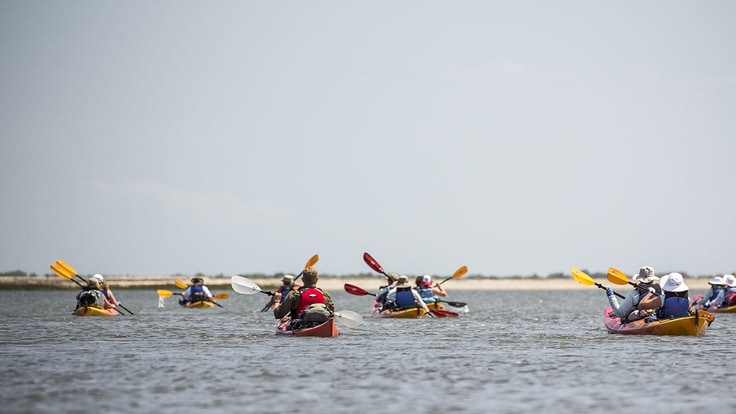Editor's note: This article was published prior to the COVID-19 pandemic. If you need to travel, check the CDC FAQ page about COVID-19 risks for travelers, which provides the latest guidance. For information about outdoor activities wherever you go (close to home is best), read Recreate Responsibly: An Activity-Specific Guide.
Have the perfect vacation in mind but confused at planning all the details? Or perhaps you think you may get in over your head by trying to do part, or all, of a trip on your own.
Either way, an organized tour can be a good solution — the tour company can take care of all the planning, so all you have to do is go on vacation.
This article gives you some tips on choosing an outfitter.
Benefits of Organized Tours
Organized tours are great for those who don't have the time, or the interest, in planning every detail of a trip. Signing up for an organized tour is an excellent way to meet and travel with people who have similar interests, which is a big benefit for single travelers. Organized tours are also convenient for older travelers or those with mobility problems. The tour company takes care of all the details, including transportation, lodging, food and sightseeing. Organized tours can also lead to a richer experience by connecting your group with knowledgeable guides and local experts, which can be harder to do on your own.
Drawbacks
Organized tours often don't leave much room for independence or exploring by yourself. Even if you'd like to stay at a museum for an extra hour or explore a city for another day, you'll have to move with the group on the scheduled itinerary.
What to Look For in a Trip
First decide what activity you'd like to do, and where you want to go. Narrow down your options by factoring in dates and your budget. Look closely at the trip you're interested in to make sure it matches your traveling style. Here are some things to consider:
- Make sure the level of physical activity matches your ability.
- Look at how much time you'll be spending on the road. Check the distances between stops and overnight stays on a map so you won't be surprised if the tour has a lot of driving time scheduled.
- Find out which activities are included and which are optional. Optional activities will give you time for some independent exploration if you're tired of being with the group.
- The tours should provide you with an experience you couldn't get on your own, such as insight from a local expert or access to places not available to the general public.
- Look up the hotel ratings in guidebooks, and find out if they're centrally located. This makes it easier for you to get out on your own when not on scheduled tours with the group.
- Find out the maximum number of people allowed in a group. That way you can avoid tours with large numbers if you'd prefer something smaller.
What to Look For in a Tour Company
Once you've found a trip you're interested in, make sure the tour company has sufficient experience and expertise. Here are some good questions to ask a tour company before you sign up for a trip:
- How long has the company been in business?
- What experience does the trip leader have? What is his or her experience in the region you'll be traveling to?
- If you're taking a special-interest tour, such as a tour focusing on art, photography, food or the outdoors, is the trip leader an expert in the field, or does the company have connections with local experts?
- What exactly is included in the cost? Airfare, meals, airport transfers and tips can sometimes cost extra.
- Can the company provide references from previous clients?
- What's the cancellation and refund policy?
Tip: Communicate with the tour company about any health concerns, disabilities or diet requirements you might have so they can be prepared to make your trip an enjoyable experience.
